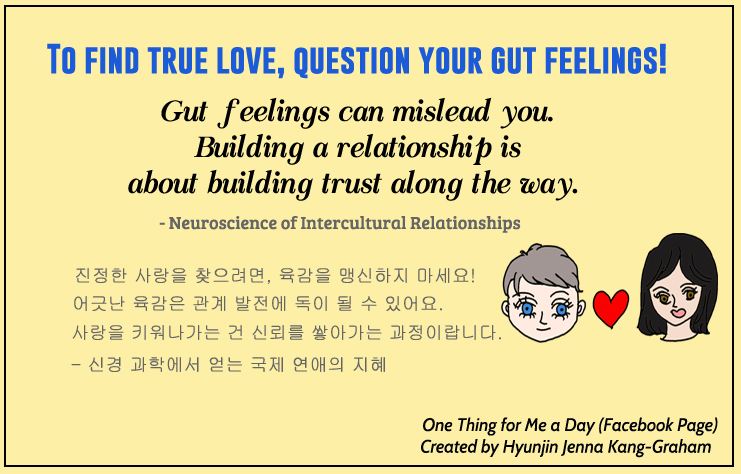
My hubby and Me on the 14th anniversary of our first date
I will write a weekly article about intercultural relationship. For the last 11 years, I have dedicated myself to reducing stereotypes about intercultural couples, contributing to increasing acceptance of cultural and ethnic diversity in Korea. Due to the belief in a one-race nation, intercultural couples in Korea were stigmatized. In January 2008, I started blogging about intercultural relationships. A year later, I created an online community for Korean women who are in romantic relationships with foreign men. It became the largest online community for intercultural couples in my country.
Many Korean women have come to me for advice about their relationships with their foreign boyfriends or husbands. In my weekly articles, I will share the most common issues that intercultural couples experience and my advice about those issues. One of the biggest concerns that Korean women have at the beginning of a relationship is whether they are being taken seriously or being played with. We call the latter the “Enjoy (Partner).” Although not all relationships need to end in marriage, Korean women want to establish exclusivity early on and prefer a relationship that puts marriage on the table.
At the beginning of a relationship, Korean women are wary of “Yellow Fever,” or the Asian Fetish. They are concerned about whether foreign men pursue them out of genuine attraction, or out of a sexual fantasy about Asian women. Having a preference for certain physical characteristics is okay, but we all want to be loved for who we are, not for being a member of a specific racial category.
Many Korean women are unsettled by their boyfriends’ interactions with other women, especially with exes or other young Korean women. Staying in contact with exes or keeping their pictures on the computer is seen as a threat. A refusal to cut off contact or delete pictures is seen as a sign of continued feelings. In extreme cases, some request their boyfriends to get permission before meeting any women. There is common advice that Korean women give to each other, “Trust your gut. If a man makes you doubt, he is not into you.”
A gut feeling comes from the prefrontal cortex’s interpretation of emotional responses triggered by the amygdala or the Lizard Brain. To ensure our survival, the Lizard Brain reacts to any potential danger. Then, the prefrontal cortex makes judgments about the perceived danger by drawing from past memories in the hippocampus, the brain’s hard drive. What we need to know about memories is that they are malleable rather than fixed. Neuroscientist Dr. Alex Korb suggests that our memories are put together from bits and pieces every time we recall them. Our emotion at the time of recall skew our memories to the positive or negative.
In fear, we are likely to paint our memories negatively and find cues that support our concern. That is, we are likely to find reasons to worry and invite jealousy into our minds. At the core of our doubt in relationships is often fear. Kristen Ulmer explains in her book the Art of Fear that the fear of abandonment lies behind accusations, immature anger, and unreasonable demands between couples.
Building a relationship is about building trust. Uncertainty at the beginning of a relationship is certain. The unknown has two sides. It excites us and scares us at the same time. Cherish the flutter you get and trust each other. Having a watchful eye on a partner never helps a relationship. Nobody wants to be accused, questioned, and watched. Arguments, accusations, and surveillance will make anyone unhappy and ruin potentially great relationships. Question your gut feelings. Your gut feelings or suspicion may turn out to be true. If they betray your trust, they don’t deserve your love anyway. Either way, question your gut feelings! If we let gut feelings rule our lives, we will lose the chances for great things – new opportunities and relationships.
